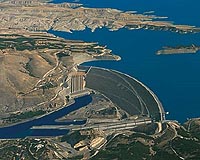| . |  |
. |
Ankara, Turkey (UPI) Sep 4, 2009 Turkey says it cannot give drought-stricken Iraq and Syria any more water from the Euphrates and Tigris rivers, claiming it's short of water itself as it forges ahead with a mammoth dam-building program. The thirsty downstream states, witnessing their farmland turning into dustbowls and their people migrating to overcrowded cities, say Turkey's dams are the root of the problem. Both rivers rise in Turkish Anatolia. "We're aware of the need for water in our neighbors but we do not have a lot of it in the reservoirs of our dams," Turkey's energy minister, Taner Yildiz, told his Iraqi and Syrian counterparts when they met in Ankara Friday. The water issue has assumed strategic proportions for Iraq and Syria, which depend on the Euphrates and the Tigris for the bulk of their water. Iraq is currently being ravaged by severe dust storms of a magnitude not seen for decades. Some officials are calling this an environmental catastrophe that is ruining what was once the region's most fertile land, turning it into a desert. Drinking water is becoming scarce. It's the same across the entire Middle East. The region has been gripped by a worsening drought for four years and faces a deteriorating crisis over dwindling water resources. In Iraq, last year's rainfall was 80 percent below normal. This year only half the normal rainfall was recorded. Things are so bad that nobody publishes rainfall figures any more. Add to this rising global food shortages and mushrooming populations, and the Middle East faces a potential calamity of possibly biblical proportions, with the states of the region vying for shrinking supplies of water. Few issues are as politically or emotionally sensitive in the Middle East as water. Control of water has been seen as an important factor in the cause of wars over the centuries. In 1967, Israeli fears that Jordan and Syria were planning to divert the headwaters of the Jordan River -- these days reduced to little more than a stream -- were seen by some as a principal cause of the Six-Day War. Many believe that Israel's occupation of South Lebanon was motivated as much from a desire to control the Litani River as to maintain a "security zone" against cross-border attacks. There are few expectations that the Ankara gathering will produce a workable solution to the water crisis involving Turkey, Iraq and Syria. Yildiz said that Turkey increased the flow rate of the Euphrates, which runs through Syria and then Iraq on its way south to the Gulf, to 517 cubic meters a second from 500 cms. But the Iraqi and Syrian ministers refuted that. "We only received 8 billion cubic meters of water from the Euphrates between August 2008 and August 2009," said Iraqi Water Minister Latif Rashid. "That means a decrease of 30 percent." He said the rainfall had decreased by 40 percent in that period. "The situation in Iraq has never been as dire as it has been in the last two years," he said, "Iraq needs more water from both Syria and Turkey." Syria's irrigation minister, Nader Bunni, said the Euphrates flow had been reduced to an average of 400 cubic meters a second through his country over the last 11 months. According to Syria's calculations, that's 100 cms less than Turkey says it is providing. Iraq also gets water from the Tigris, which flows directly from Turkey and, unlike the Euphrates, does not flow through Syria. Iraq is also being hit from the east. Iran too is building dams that have curtailed the flow of westward-flowing rivers like the Karun and tributaries that debouch into the Shatt al-Arab, a waterway formed by the confluence of the Euphrates and the Tigris. The Middle East's population is rising at an average rate of around 3.5 percent a year. It has more than quadrupled since 1950, to 364 million. It's expected to hit 600 million by 2050. By then water will be in far shorter supply than it is now and diminishing resources could inflame political tensions -- as between Turkey, Iraq and Syria; Israel and the Palestinians; Egypt and the eight countries with which it shares the Nile -- to a dangerous level. Share This Article With Planet Earth
Related Links Water News - Science, Technology and Politics
 Turkey unable to give more water to Iraq, Syria: minister
Turkey unable to give more water to Iraq, Syria: ministerAnkara (AFP) Sept 3, 2009 Turkey cannot give more water to Iraq and Syria, Energy Minister Taner Yildiz said Thursday as officials from the three neighbours met here to discuss the sharing of the Tigris and Euphrates rivers. The Ankara talks follow Iraqi accusations last month that Turkey was holding back water despite a promise to increase the flow into its drought-stricken southern neighbour. "We are aware of ... read more |
|
| The content herein, unless otherwise known to be public domain, are Copyright 1995-2009 - SpaceDaily. AFP and UPI Wire Stories are copyright Agence France-Presse and United Press International. ESA Portal Reports are copyright European Space Agency. All NASA sourced material is public domain. Additional copyrights may apply in whole or part to other bona fide parties. Advertising does not imply endorsement,agreement or approval of any opinions, statements or information provided by SpaceDaily on any Web page published or hosted by SpaceDaily. Privacy Statement |